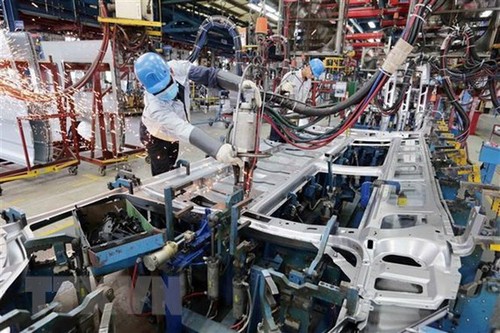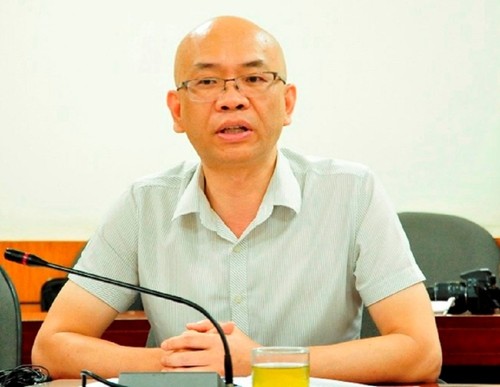 Workers at a car assembly line in northern Vietnam. (Photo: VNA/VNS) Workers at a car assembly line in northern Vietnam. (Photo: VNA/VNS)
|
Vietnam's economy lost 37 billion USD due to the COVID-19 pandemic over the past two years.
Despite the pandemic, Vietnam fulfilled a number of economic targets in 2021. The GDP grew 2%, foreign trade surpassed 660 billion USD, and foreign direct investment surpassed 31 billion USD.
These achievements were made possible by Vietnam shifting its strategy from “zero COVID-19” to safely and flexibly adapting to and effectively controlling the pandemic while gradually easing social distancing and re-opening economic activities.
In the third and fourth quarters of 2021, the Vietnamese economy began to bounce back, creating momentum for 2022.
In 2021, businesses in garments and textiles, machinery and equipment, and spare parts developed scenarios to adapt to the “new normal” and ensure stable production and sales while trying to complete plans on schedule. Production in several key industries grew more than 10% last year. Metal production increased 23% and automobile production 11%.
These achievements are attributable to the policies that the Government and ministries have promulgated to help enterprises recover.
Trade was the highlight of Vietnam’s economy last year, with trade turnover surpassing 660 billion USD. That has placed Vietnam in the world’s top 20 economies in international trade. Vietnam has been a trade surplus country for 6 consecutive years.
 Tran Thanh Hai, Deputy Director of the Import-Export Department of the Ministry of Industry and Trade (Photo: qdnd.vn) Tran Thanh Hai, Deputy Director of the Import-Export Department of the Ministry of Industry and Trade (Photo: qdnd.vn) |
Tran Thanh Hai, Deputy Director of the Import-Export Department of the Ministry of Industry and Trade, said, “First the product structure has changed. Processed and industrial products now account for 86% of the total export value. The export proportion of raw materials has decreased, and the proportion of processed items grew 18%, helping to maintain national growth.”
“Vietnam’s export markets have expanded and diversified thanks to free trade agreements. This includes the markets of the EU, the UK, and new markets in the Comprehensive and Progressive Agreement for Trans-Pacific Partnership (CPTPP) like Mexico, Canada and Peru,” Hai added.
Agricultural production contributed to ensuring social security, national food security, and export growth, proving that agriculture remains a firm economic pillar in any circumstances.
In the first 11 months of 2021, Vietnam earned 43.5 billion USD from selling agricultural, forestry, and fishery products abroad, up more than 14%. The agricultural sector reached its target for the year a month ahead of schedule, and by end of December, farm exports exceeded 45 billion USD.
 Vu Tien Loc, President of the Vietnam International Arbitration Center (Photo: qdnd.vn) Vu Tien Loc, President of the Vietnam International Arbitration Center (Photo: qdnd.vn) |
According to Vu Tien Loc, President of the Vietnam International Arbitration Center, “Agriculture is one of Vietnam’s core competitive advantages. In any circumstances, agriculture remains a mainstay of the economy, and right now the demand for farm produce is on the rise.”
Exports continue to drive Vietnam’s national economy and in 2022 the economy is forecast to recovery strongly. Vietnam will continue to make the most of opportunities to boost export growth from 13% to 15%.
The Asian Development Bank forecast Vietnam’s growth rate will be 6.5% in 2022. It will be 6.8% by the HSBC’s forecast. World Bank Chief Economist in Vietnam Jacquest Marisset says Vietnam’s GDP growth target of between 6% and 6.5% this year is feasible.